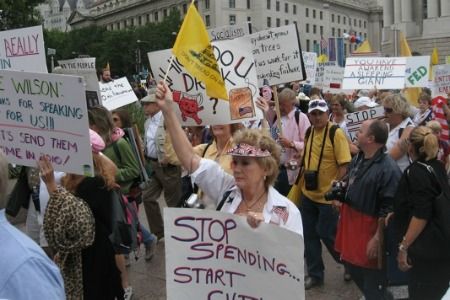Less Politics, More Economics
Over the past few days, I've written on this site about the inadequacy of conservative thinking about the economic crisis that has beset the United States and the world.
I've argued in particular that conservatives often overstate President Obama's culpability for the severity of the downturn. I agree with the conservative view that the president's policies are detrimental to the long-term growth of the United States. I agree too that Obama has not responded effectively enough to the crisis. Once more and with feeling: I am not a supporter of this president or his policies. But to say "he has failed to respond as effectively as he should have" is a very different thing from "he made it worse." That claim I think is insupportable.
This view of mine has triggered a lot of negative comments from fellow conservatives. I am posting a good example of one of these comments on the site today, a piece by FrumForum contributor Jeff Burk that forcefully states what I think is fair to call the mainstream conservative view that Obama made the economy worse.
Take a look, then return here for a reply.
OK?
OK.
Burk makes four main points:
1) $800 billion in stimulus spending has created expectations of future tax increases that weigh heavily on job creators.
2) The Affordable Care Act and the emergency economic actions of the Obama administration have created regulatory uncertainty that likewise weighs heavily.
3) President Obama has interfered with the housing market reaching its natural bottom, whence recovery could begin.
4) Through the stimulus and the Affordable Care Act, President Obama has generally shifted resources from the private sector to the public sector.
I think it's fair to say that this critique would be endorsed by most conservative economic commentators. I think it's equally fair to say they would be endorsed by very few conservative economists. We saw just yesterday that Vince Reinhart does not agree. I very much doubt that Glenn Hubbard, Greg Mankiw, John Makin, or Martin Feldstein would agree either.
Any account of what has happened since October 2008 needs to take into account these shaping facts:
1) We have had a global crisis and a global recession, not in America alone.
2) The shock to the world economy has been massive. We have had a massive disappearance of paper wealth: about $10 trillion in the US alone. To put that effect in context, remember that the entire sub prime industry was worth about $200 billion, including both new loans and cash-out refinancing.
3) At no time since January 2009 have taxes been higher in the US than they were in 2007. Right now, taxes are lower. There is no possibility of any tax increase until 2013. As of 2013, we will have had the same tax rates in place for a decade.
Now specifically:
1) The conservative critique of Obama rests heavily on the spectre of "uncertainty." Obama's actions have created a lot of "uncertainty" and that is holding business back.
Sorry, but I find it impossible to take this argument seriously. Uncertainty is the most fundamental fact of economic life. As long ago as 1922, Ludwig von Mises brilliantly cited the inescapability of uncertainty as the reason that socialist planning must fail. He could have added: few things are as dangerous to a capitalist economy as the delusion that uncertainty has been banished. If back in 2005 we'd had a little less certainty about the housing market, we'd all be a lot happier today.
The main target to date of the Obama regulatory agenda has been the financial services industry. That's the one industry that has recovered most completely from the recession. And frankly, the practices most aggressively targeted by the Obama administration - e.g. in the credit card industry - were so abusive that you have to question: can it really be true that the growth of the US economy depends on duping poor and ignorant people into paying 27% interest rates?
2) Jeffrey Burk is right to locate the origins of the crisis in the US housing market. He's probably right to sense that recovery won't accelerate until the housing market has normalized itself.
But two more things must be said:
a) Economies are complex feedback mechanisms, not simple accounting formulas. You don't necessarily recover from a bubble faster by squeezing the remains of the bubble harder. The "purge the unsoundness" approach of an Andrew Mellon can transform a nasty recession into an outright depression. You don't have to accept the whole Keynesian program to appreciate that such a thing as aggregate demand does exist and does matter.
b) Exactly how did Barack Obama prevent the housing market from reaching bottom? The administration's mortgage relief programs have been an utter and acknowledged failure. What's keeping underwater homeowners in their houses is not this administration's actions, but the magnitude of the housing disaster: the banks simply can't foreclose fast enough, and each new wave of foreclosures causes price declines that put more people underwater.
3) Finally: it's really, really important to understand the difference between the long-term and the short-term. Higher taxes after 2014 may well slow the long-term growth trajectory of the United States, all other things being equal. But no business that sees a chance to use labor profitably right now will decline the opportunity because of fears of what may happen three years in the future. If businesses are not hiring today, it's because business conditions are lousy today. And they are lousy because of the massive and abrupt collapse that occurred in the fall in 2008 - and from which the US has recovered just as slowly as predicted by the best historical study of financial collapse. (Also by coincidence published in 2008.)


